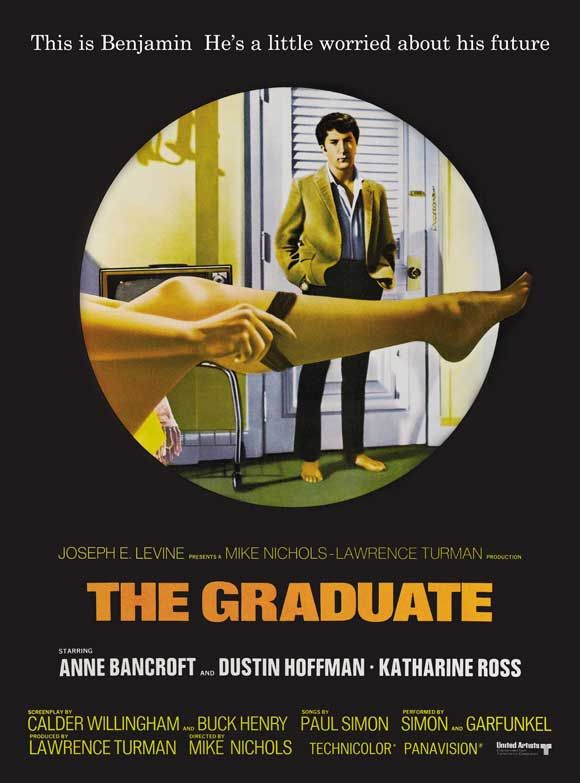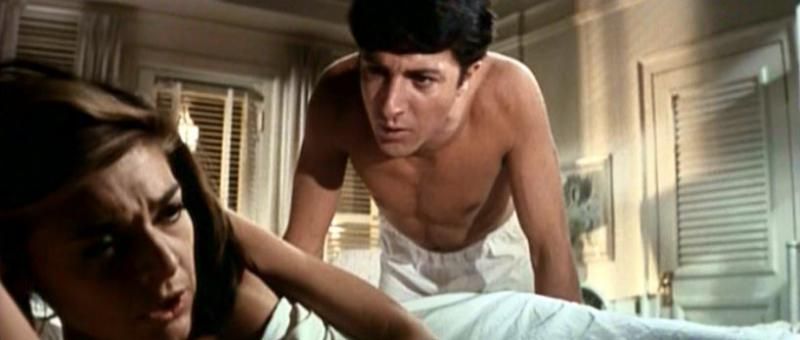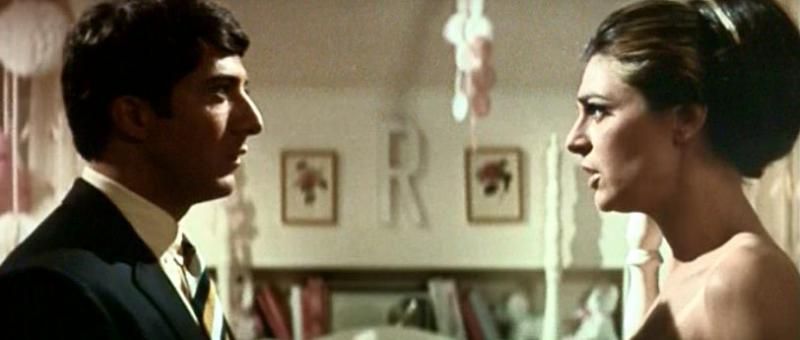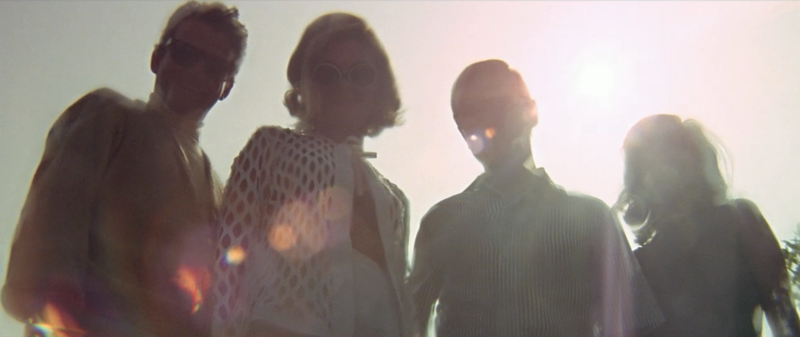The
Graduate
1967
Director: Mike Nichols
Starring: Dustin Hoffman, Anne
Bancroft, Katharine Ross
While
not as definitive or landmark a film to me as it is to many people, especially
those of my parents’ generation, The Graduate remains a potent,
awkwardly comic, and ever-unsettling coming of age story. Given that the first time I saw it, I had not
yet really “come of age,” it makes sense that it was mostly lost on me then. Re-evaluating it, however, in order to write
this piece, I found myself smiling, cringing, and appreciating The
Graduate in a way I distinctly do not remember doing before.
Benjamin
Braddock (Hoffman) has just graduated with awards and honors from college, but
he isn’t in a celebratory mood. Upset
and disconnected, he doesn’t know what he wants to do. Enter Mrs. Robinson (Bancroft), his father’s
business partner’s wife, a woman he has known since childhood. When Mrs. Robinson tells Ben that she would
like to sleep with him, the two enter into the least sexy affair you’ve seen in
some time, one born of a desire to escape boredom rather than any kind of
attraction. Things get immensely
complicated when Mrs. Robinson’s daughter Elaine (Ross) comes home from college
on break and Ben finds himself falling in love with her.
Part
of the reason I felt so massively underwhelmed by The Graduate when I first
saw it was its advertisement as a comedy.
In seeing it a second time, I think I chuckled maybe three times, and
smiled about half a dozen times. If
you’re watching The Graduate expecting a laugh riot, well, don’t. Categorization of this film is tough, as
there are certainly comic moments (“Plastics” is good for a smile, as is
“You’re the most attractive of my parents’ friends”), but overall, I find it a
very emotional story. Terms like
“dramedy” were invented with films like this in mind. But I remembered that I didn’t find it laugh
out loud funny, and approached The Graduate a second time watching
it as a drama. The film makes more sense
to me this way.
Benjamin’s
tale is a difficult one; a young man who has achieved much in school but now
finds himself lost. He is Hemingway’s
Lost Generation, he is Generation X of the nineties, as he battles this sort of
existential angst that threatens to consume his very soul. Benjamin does many things in The
Graduate to try to distract himself from this frighteningly hollow
sense of emptiness and despair, but he never really manages to succeed; the
famous final shot is proof enough of that.
Mrs. Robinson is a physical distraction, and her daughter Elaine isn’t
much more. Benjamin becomes obsessed
with the idea of Elaine rather than Elaine herself, and I have trouble buying
that his protestations of love for her are real. He sees in Elaine a kind, gentle young woman
and suddenly a possible pathway out of his despair appears to him. Had it been a different girl at a different
time, he would have been pounding on the window of a different church at the
end. It was not Elaine in particular, it
was the notion of her. But neither the
thought of Elaine nor Elaine herself can save him from his life, as the
ambiguously downbeat ending seems to say.
Nor is Benjamin terribly likeable.
While, as the definite central character of the film, there is an
automatic tendency to want to root for him, Benjamin does many things that make
this difficult. Stalking Elaine, for
instance, after knowing her a relatively small period of time and upsetting her
greatly; engaging in emotionally self-destructive behavior for another. I suppose he is the “hero” of The
Graduate, but that does not make him good.
Hoffman,
in his first major film role, is tremendously good as Benjamin. His performance in the first half, before
Benjamin has met Elaine, is nothing short of phenomenal. Hoffman is awkward and uncomfortable in
everything he does, from robotically grabbing Mrs. Robinson’s breast to sitting
on the bottom of the swimming pool in a diving suit to nervously checking out a
room at the Taft Hotel. Rather than the
Hoffman that is more well known today, one who overacts and typically delivers
broad performances, this is an incredibly self-contained Hoffman. We feel how much he is holding on the inside
as Benjamin, how much unnamed pain he carries around, how unhappy and depressed
he is as he presents a bland smile to the camera. Hoffman loosens Benjamin up in the second
half after Elaine has been introduced, hinting at her as his possible
salvation, but the performance isn’t quite as interesting. It makes sense, yes, just not as
compelling.
Mike
Nichols, in only his second feature film (after Who’s Afraid of Virginia Woolf?),
directs a visually fascinating story.
The influence of the French New Wave is all over The Graduate, most
notably in the montage where Benjamin is against a black background and we see
him watching TV or sleeping with Mrs. Robinson or avoiding his parents. There are a few nifty match cuts (jumping on
a raft switches to jumping on Mrs. Robinson), some interesting point-of-view
scenes (watching from Ben’s view as he is in his scuba suit and all we hear is
breathing), and a lack of fear about getting too far away or too close to the
actors. There are times when he
physically distances the camera from the actors, there are long takes, and
scenes where we cannot hear the conversation being carried out. The Graduate burst on the scene in
1967 to much acclaim, and with filmmaking techniques this innovative for the
time, it’s easy to see why. It still
felt fresh to me, despite the fact that the film is *gulp* coming up on its
fiftieth anniversary.
Having
lived through my horrible twenties and some slight adventures in depression, I
can, in some way, relate to Benjamin Braddock.
I don’t approve of his actions, but his feeling of discontent feels all
too familiar. Brilliant performances by
Hoffman and Bancroft (which I did not mention here, but she fills the screen as
the dominatrix-esque Mrs. Robinson), Simon and Garfunkel’s iconic soundtrack,
Nichols’ glorious cinematography, and its undeniable place as a touchstone film
for an entire generation ensure that The Graduate will continue to be
discussed for years to come.
Arbitrary
Rating; 8/10




This film had been hyped to the heavens so when I saw it I was inevitably let down. The thing is, I would have felt it wasn't that good a movie anyway even if I had known nothing about it beforehand. This is on my short list of the "all time classic" movies that were massive disappointments when I finally saw them. Other than the music, and Katherine Ross' beauty, I have nothing good to say about this movie.
ReplyDeleteFor what it's worth: if you've never seen Rumor Has It (2005), you may want to now, not because it's a must see movie, but because it dovetails with this film. The concept of it is what if the events of The Graduate were based on real people and a daughter finds out it was her mother and grandmother who were Mrs. Robinson and her daughter.
I found it amusing. Critics seemed to think it was sacriligeous to even think of making a comedy about The Graduate, let alone actually releasing one. Here's the trailer:
http://www.imdb.com/video/screenplay/vi26280217/
My parents have been nattering on about how I have to see Rumor Has It for years now, so I am well aware of its existence. I'm sure one of these days, when I don't have hundreds of other movies to see, I'll finally get around to it.
DeleteToo little time, man.
I actually know what you mean when you talk about not being impressed with this, The Graduate, because that's pretty much what I felt the first time I saw it. I know where you're coming from; I just felt far more emotionally invested in the second go around.
Things are always a bit funny when trying to judge relative attractiveness of one's own sex, as I am underwhelmed by Katharine Ross' beauty. Do I understand, empirically, how someone could find her attractive? sure. Do I think she's attractive? No, not at all. Something about her eyes screams "there's nothing going on upstairs!" to me. Or maybe that's just her acting. OH I WENT THERE!!!! :D
I might be of your parents generation and I think my own parents may have taken me to see this (what were they thinking?). Anyway, I think the performances of Hoffman and Bancroft are classic. That scene where Benjamin tries to get Mrs. Robinson to have a conversation in the hotel room is one of my favorites. Also their very first tryst. ("Aren't forgetting something Benjamin?)
ReplyDeleteI'm a little amused when parents take their children to see inappropriate films. While my father's attitude toward film was hugely influential for me, I was a bit uncomfortable when he took me to see Pulp Fiction - when I was 15. Ah well.
DeleteHoffman is so good. Bancroft is so good. I love how Hoffman starts banging his head against the hotel room wall in that first scene. Apparently the director had to seriously stifle his laughs when Hoffman did that, because it wasn't in the script.